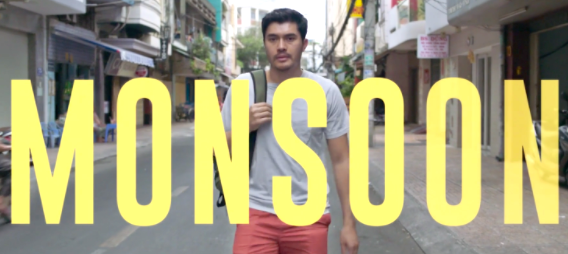by Allen Nguyen

Henry Golding was eight years old when he and his family left Malaysia for England. Director Hong Khaou (Lilting) was an infant when his family fled the Khmer Rouge for Vietnam. That shared experience of displacement-fueled ambiguity and the concept of reconciling one’s national identity is the foundation on which the new film Monsoon is built.
Golding plays Kit, a British-Vietnamese man who returns to the country he and his family fled some thirty years prior. Kit cannot speak Vietnamese, has cloudy childhood memories of life in Vietnam, and is unable to process the unfamiliarity of the land he once called home...

Kit’s here to scout locations in Saigon and Hanoi for the sole purpose of scattering his parents’ ashes, though the trip itself effectively moonlights as an opaque if not labyrinthine journey of cultural self-discovery and motherland rediscovery. Along the way, a Grindr date and one-night stand with American expatriate Lewis (Parker Sawyers) burgeons into something deeper. (Sidebar: Khaou’s choice to treat Kit’s sexuality as completely unrelated to the strife he endures is very much welcomed and should be normalized!)
In essence, Monsoon is like a gay Vietnamese cousin to Nomadland: it’s serene, gentle, at times touching. Any turbulence suggested by its title is strictly contained within Kit, whose pensive introspection (done with steadfast commitment by Golding) is intriguing, though it wears a bit thin within the confines of a film that offers little by way of dramatic tension or forward-moving plot development.

As a result, we’re witness to what feels like a series of scenic shots of Kit looking yonder, assessing his surroundings, caught up in everlasting rumination. We wait to see what will happen next, though nothing ever really does. At a technically succinct 85 minutes (normalize short running times!) Monsoon unravels at such a leisurely pace that the film at times feels longer than it actually is. The prospect of romance, discussions on the enduring impact of the war, and matters of familial relationships are broached, yet nothing is ever explored at depth. What we have on our hands then is a supremely internalized character study, and one is left to wonder whether Monsoon is too under-developed for its own good.
I say this as someone who was both profoundly moved and left cold by the film. As a second-generation Vietnamese-American, child to a mother who immigrated to the United States by boat and a father imprisoned in a re-education camp, Monsoon ended up hitting closer to home than I’d expected. Kit’s expressed regret of not asking his late parents about Vietnam enough when he was growing up made me want to call my parents immediately. The scenes that Kit shares with second-cousin Lee (played by David Tran) sting with melancholy, and brings to mind the extended families I know who remain in an East/West separation to this day. And having never been to Vietnam before, it’s stirring to live through Kit as he navigates the motherland of which we’re both unacquainted.
Fans of Khaou’s debut feature Lilting might recognize some of the stylistic and narrative parallels to Monsoon -- the long pan shots; supporting characters acting as third-party foreign language translators; the presence of a loved one’s ashes; a lover offering up a ride. Yet the most striking discrepancy between the two films is how chilly and detached Monsoon feels.

Perhaps this was Khaou’s intent, though I can’t help but wonder if Monsoon would be less aloof -- toward Vietnam, and tonally as a whole -- had either the director or the leading man actually been of Vietnamese nationality. Ultimately, it’s difficult to shake the fact that Kit’s soul-searching perpetually keeps us at a distance, and it appears to come at the cost of the sort of warmth and earnestness which was so beautifully imbued through Lilting’s heartbroken Richard. In any case, perhaps it’s perfectly fitting that I should be as intrigued, conflicted and indifferent towards Monsoon as its lead character is to Vietnam. Watch it for Golding’s performance (also because, obviously, he’s stunning, and he has an affinity for nipple play in his love scenes) and for the film’s modest grace, but expect to be left feeling vaguely unfulfilled. B-